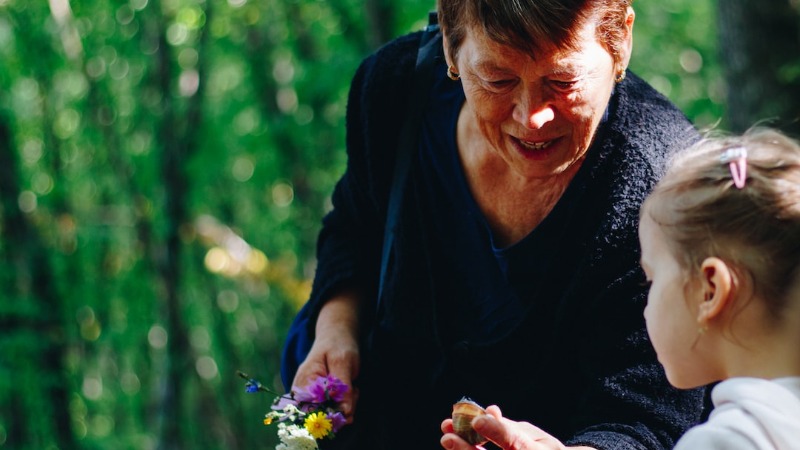9 Ways to Honor and Respect Your Elders
Contents
Respecting our elders should be a courtesy ingrained in every one of us. Common grace and manners are to treat elders with dignity and respect. Sadly, these important dignities have been largely forgotten in today’s society.
The Information Age has put technology at the forefront of human communication; making today a little less personal than days of the past. Between bustling schedules of juggling family life and work, in addition to reaching people through cyberspace as the main mode of connection; manners have somehow been forgotten. Instead of treating our elders with the appreciation and respect they deserve, many are often either too busy or simply dismiss them and their contributions to the community and family.
Ways to Respect Elders
Senior citizens have a lifetime of experience. They comprise a generation that has survived The Great Depression, World War II, Vietnam, and The Great Recession. These sage Americans have a thing or two to teach us about enduring change and handling life’s adversity.
Even if a senior’s hearing or memory isn’t what it was in the past, our elders have great wisdom to impart. It’s one thing to read about Pearl Harbor, but it’s more engrossing to hear about it from someone with first-hand knowledge. Younger generations must learn the importance of respecting their elders and making time to listen and spend quality with them.
The senior population, aged 65 and older, has more than doubled since 2013, according to the Bureau of Labor Statistics. The U.S. Census Bureau reports that, in 2011, seniors accounted for 13.3% of the total population, with 9.2 million of those estimated to be veterans of the armed forces. Older Americans have a huge impact on our society, both past and present. From the wisdom and experience of the “Greatest Generation” to the vitality and engagement of the retiring Baby Boomers, we need to remember and honor our older Americans.
Read below for a few ways to recognize and appreciate our elders:
1. Spend time with them (and listen intently).
Many seniors get lonely, whether they’re retired and no longer have their work social schedule, or they’re lost their spouse and some friends. Regardless, they still need a rich social circle for happiness as many can get isolated over time; which can lead to health decline. It’s important to take time to visit elderly loved ones to not only spend precious time with them and learn from them; but also give them purpose, as relationships are key to healthy aging. When in the presence of an elder, make sure to listen as the senior’s words come from a place with many decades of experience. The conversation can be beneficial to both of you.
2. Be polite.
Being polite to an elder is a demonstration of respect. Older Americans grew up during a time when manners and respect were part of everyday etiquette. If they are talking, listen to them. Don’t interrupt them or address them by their first name, unless given permission. Being respectful may not only brighten their day, but also yours, as you may learn a thing or two (or just feel good about brightening someone’s day!).
3. Ask for advice.
Sadly, ageism exists, even though elders are some of the most wise people in society. It’s a shame to think that an elder, with a lifetime of experience, would be overlooked for their advice. Seniors have a lot to contribute to society through their life experiences, so seeking counsel from an elder is time well spent. You will both appreciate the sentiment.
4. Eat together.
Eating together is one of the greatest social customs of mankind. While nourishing your bodies, you also get to catch up and have fun. Whether you venture to a favorite restaurant, pack a picnic, or visit your senior loved ones’ home, try to eat together on a regular basis.
5. Discuss family heritage, history and traditions.
There’s an undeniable strength in family stories. In fact, putting together an oral family history can not only bring family members together and strengthen the ties between generations, but they can also educate about family genetics, personalities, and more. Family history translates into stronger family bonds and life successes. In fact, recent studies have shown that children who have more knowledge of their family history also tend to show greater emotional resilience, facing stress and challenges more effectively as they have a stronger sense of where they come from and who they are.
A survey conducted by Harris Poll and commissioned by A Place for Mom revealed the following topics were what U.S. adults wanted to know about their family members, specifically their moms:
- Career highlights (e.g., significant work achievements, favorite job)
- Family history (e.g., genealogy, origins of the family)
- Life advice (e.g., view on aging, words of wisdom to share with children and grandchildren)
- Medical history (e.g. health issues common with family members, life-threatening disease diagnosis)
- Personal history (e.g., childhood memories, dating history)
Almost like a puzzle, heritage is many pieces that form a masterpiece to comprise an individual and their journey. Taking the time to visit aging loved ones during the holidays to no not only reconnect but also gather pieces of their heritage puzzle, can provide important info to pass on for posterity. After all, information about families is lost in three generations if not written down.
6. Call them.
If you live too far from your elderly loved one to see them on a regular basis, pick up the phone and call them. In our busy lives, it’s easy to forget the amount of meaning an elder will experience if we take time out of our day to say ‘hello’ and chat. Phone calls are a personal way of saying you care.
7. Tell them how much you appreciate and respect them.
Even if you demonstrate that you respect your elders through your actions, it’s important to actually tell them how much you appreciate and respect them. Compliments and giving people purpose, especially older Americans, is a very positive message. If there is a senior who has positively impacted you, make sure to share this with them; it will probably bring a smile to their face.
8. Visit senior living communities.
The world moves at a fast pace and people sometimes forget what’s truly important. Seniors are sometimes forgotten but are still very much alive. By visiting senior living communities, you communicate to seniors that you care. You give them purpose and conversation through social interaction. Visiting a senior living community, whether your loved one lives there or not, is an excellent way to reach out to the older community and show them you care.
9. Volunteer at a senior center.
When we give, we feel better. Pay it forward is a good mantra to follow. It’s the infinitely touching moments in our lives that make it all worthwhile, and often times these moments are the ones spent volunteering for seniors and giving to those in need. A little goes a long way in a nursing home or senior living community. Discover how the holidays are an excellent opportunity for volunteering in a senior living community as there are often activities and opportunities to help with festive gatherings and celebrations.
Intergenerational Relationships & Personal Growth
Intergenerational relationships have a profound impact on personal growth and development. In today’s fast-paced and technology-driven world, it is easy to get caught up in our own generation’s perspectives and experiences. However, by engaging with and learning from our elders, we can gain valuable insights and wisdom that can shape our lives in meaningful ways.
One of the key benefits of intergenerational relationships is the opportunity to learn from the experiences and life lessons of our elders. They have lived through different eras, witnessed historical events, and navigated various challenges. Their unique perspectives can provide us with invaluable guidance and a broader understanding of life.
Spending time with older generations can foster a sense of empathy and compassion. Hearing their stories and understanding their struggles can help us develop a deeper appreciation for the resilience and strength of the human spirit. By honoring our elders, we acknowledge the wisdom they possess and create a space for mutual respect and understanding.
Intergenerational relationships also offer an opportunity for personal growth through the exchange of knowledge and skills. Elders often have a wealth of practical knowledge that they can pass down to younger generations. Whether it’s learning a traditional craft, cooking a family recipe, or acquiring life skills, these interactions enable us to expand our horizons and develop new abilities.
Relationships with your elders provide a sense of connection and belonging. In a society that often values youth and novelty, acknowledging and honoring our elders can foster a sense of community and inclusivity. By bridging the gap between generations, we create a more cohesive and supportive society where everyone’s contributions are valued.
Breaking down stereotypes and biases about aging
Breaking down stereotypes and biases about aging is crucial in order to honor and learn from our elders. Society often perpetuates negative stereotypes about aging, portraying older individuals as frail, forgetful, and irrelevant. However, this mindset overlooks the wealth of wisdom and experience that older generations possess.
- Challenge these stereotypes and recognize the diversity and vitality that exists within the aging population. Our elders have unique stories to tell, a lifetime of lessons learned, and valuable perspectives to offer. By breaking down stereotypes, we open ourselves up to the opportunity of learning from our elders and gaining invaluable insights that can enrich our lives.
- Creating spaces where different age groups can come together fosters understanding and breaks down the barriers that divide us. Through meaningful conversations and shared experiences, we can bridge the generation gap and foster mutual respect.
- Recognize the impact of ageism and actively combat it. Ageism can lead to discrimination, exclusion, and marginalization of older individuals. By challenging ageist attitudes and advocating for equal rights and opportunities for people of all ages, we can create a more inclusive and respectful society.
We hope you found our blog post on the power of respect and honoring our elders insightful and inspiring. In a society that often values youth and dismisses the wisdom of the older generation, it is crucial to recognize the immense value and knowledge that our elders possess. By honoring and learning from them, we not only show them the respect they deserve but also gain invaluable insights and guidance for our own lives. Let us remember to cherish and embrace the wisdom and experiences of our elders, for they are the foundation upon which our future is built.
How has a senior positively impacted your life? In what other ways can we honor our elders? Share your stories and suggestions with us in the comments below.







